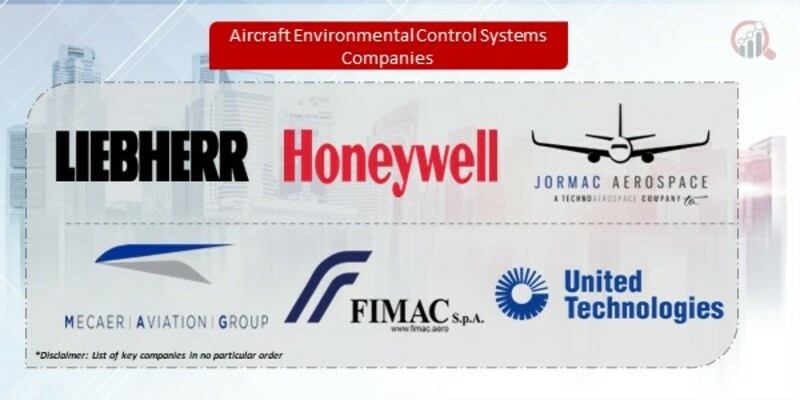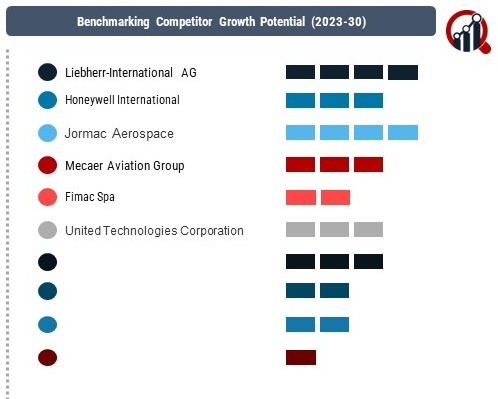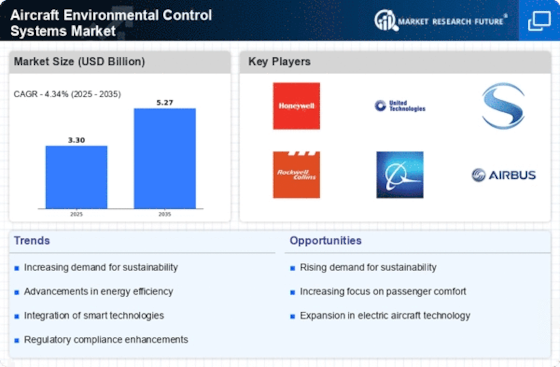Top Industry Leaders in the Aircraft Environmental Control Systems Market

Key Players in the Aircraft ECS Market:
- Liebherr-International AG (Switzerland)
- Honeywell International (U.S.)
- Jormac Aerospace (U.S.)
- Mecaer Aviation Group (Italy)
- Fimac Spa (Italy)
- United Technologies Corporation (U.S.)
Strategies Adopted for Market Dominance:
To maintain a competitive edge, key players in the Aircraft ECS market employ diverse strategies. Research and development initiatives are crucial, with a focus on introducing innovative technologies that enhance energy efficiency, reduce environmental impact, and improve overall system performance. Collaborations with aircraft manufacturers and airlines are common, allowing ECS providers to tailor their solutions to specific aircraft models and operational requirements. Additionally, strategic mergers and acquisitions enable companies to broaden their product offerings and expand their global footprint.
Factors for Market Share Analysis:
Several factors contribute to the analysis of market share within the Aircraft ECS sector. Technological innovation, regulatory compliance, global reach, and customer satisfaction are key determinants. Companies that consistently invest in research and development, aligning their offerings with the latest industry trends, tend to capture a larger market share. Moreover, effective supply chain management and strategic partnerships with suppliers contribute to cost efficiency, impacting market share positively.
New and Emerging Companies:
The Aircraft ECS market is witnessing the emergence of new players, often characterized by a focus on niche segments or disruptive technologies. Start-ups like Green AeroTech and AirControl Technologies are gaining attention with their innovative approaches to environmental control systems. These companies often introduce novel materials, advanced sensors, and data analytics to optimize ECS performance, catering to the demand for more sustainable aviation solutions.
Industry News and Developments:
Recent industry news highlights the dynamic nature of the Aircraft ECS market. Regulatory changes, such as stricter emissions standards and noise reduction requirements, drive innovation within the sector. Companies are investing in eco-friendly technologies, including electric and hybrid ECS solutions, aligning with the broader aviation industry's push towards sustainability. Moreover, advancements in smart and connected ECS, incorporating Internet of Things (IoT) capabilities, are reshaping the market landscape.
Current Company Investment Trends:
Investment trends in the Aircraft ECS market reflect the industry's evolution towards more sophisticated and sustainable solutions. Companies are allocating significant resources to research and development, aiming to introduce next-generation ECS technologies. Funding is directed towards improving energy efficiency, enhancing cabin air quality, and addressing emerging challenges such as the impact of climate change on aviation. Strategic investments in digitalization and cybersecurity measures are also prevalent, ensuring the resilience of ECS systems against evolving threats.
Overall Competitive Scenario:
The competitive scenario in the Aircraft ECS market is marked by a delicate balance between established players and innovative newcomers. While industry giants maintain their dominance through comprehensive product offerings and global reach, emerging companies disrupt the status quo with specialized solutions and a focus on sustainability. The race for market share is increasingly influenced by technological prowess, regulatory compliance, and the ability to adapt to evolving industry trends. Strategic partnerships, mergers, and acquisitions are likely to continue shaping the competitive landscape as companies seek to consolidate their positions and capitalize on emerging opportunities in the dynamic aviation sector.
the Aircraft ECS market is a dynamic and competitive space where key players, both traditional and new entrants, strive for supremacy through innovation, strategic collaborations, and a commitment to meeting the evolving needs of the aviation industry. The ongoing emphasis on sustainability, technological advancements, and regulatory compliance will continue to drive the competitive landscape, making it imperative for companies to stay agile and forward-thinking in their approach.
Recent News :
Aircraft Environmental Control Systems (ECS) market is seeing some exciting developments across key players, driven by technological advancements, sustainability goals, and increasing aircraft demand. Here's a closer look at recent activities by some prominent companies:
Honeywell Aerospace:
- Developed next-generation digital cabin pressure control and monitoring systems: These systems are 30% lighter, more reliable, and customizable for a wide range of aircraft, promoting efficiency and reducing maintenance needs.
- Investment in electric ECS technologies: Honeywell is exploring potential applications of electric motors and heat exchangers in future ECS designs, aiming for reduced fuel consumption and emissions.
- Focus on smart maintenance and data analytics: Honeywell leverages sensor data and AI-powered tools to predict ECS component failures and optimize maintenance schedules, minimizing downtime and costs.
Collins Aerospace:
- Introduced Integrated Air System Controller (IASC) technology: This technology combines multiple ECS functions into a single unit, simplifying system design, reducing weight, and enhancing reliability.
- Development of advanced bleed systems and subfreezing packs: These innovations improve air conditioning performance and cooling capacity in hot or high-altitude environments, enhancing passenger comfort and operational efficiency.
- Focus on cabin air quality and purification: Collins Aerospace offers advanced filtration systems and UV sanitizers that remove impurities and pathogens from the aircraft cabin, ensuring a healthier and more pleasant travel experience.
Safran Aircraft Engines:
- Launched ENVISION® ECS suite with modular and scalable design: This allows airlines to tailor the ECS configuration to their specific needs and aircraft types, optimizing performance and reducing system complexity.
- Investment in hybrid ECS solutions: Safran is exploring combining electric and traditional gas turbine-powered systems for improved fuel efficiency and noise reduction.
- Focus on sustainable materials and eco-friendly practices: Safran prioritizes using lightweight and recyclable materials in their ECS components, aiming to minimize environmental impact throughout the product lifecycle.











